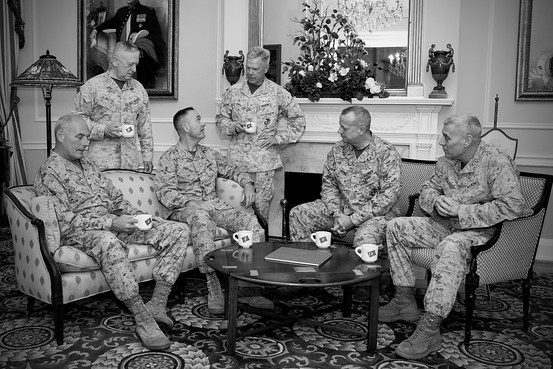
President Donald Trump signed an executive order calling for the creation of a strategy to defeat the Islamic State, bringing in multiple federal departments and agencies with requirements that closely mirror how the Obama Administration had approached the problem.
The Jan. 28 “Presidential Memorandum Plan to Defeat the Islamic State of Iraq and Syria” states that “development of a new plan to defeat ISIS (the Plan) shall commence immediately” and that a draft be submitted by Defense Secretary James Mattis within 30 days.
That plan must include “public diplomacy, information operations, and cyber strategies to isolate and delegitimize ISIS and its radical Islamist ideology; identification of new coalition partners in the fight against ISIS and policies to empower coalition partners to fight ISIS and its affiliates; mechanisms to cut off or seize ISIS’s financial support, including financial transfers, money laundering, oil revenue, human trafficking, sales of looted art and historical artifacts, and other revenue sources,” the memo reads.
In those respects, the focus is similar to what the previous administration pursued, as described by retired Marine Corps Gen. John Allen at the U.S. Naval Institute’s 2015 Naval History Conference. Allen, who at the time was serving as special envoy to the global coalition to defeat the Islamic State, described the five-pronged approach he and other global leaders were pursuing: “to deny ISIS a safe haven and provide security assistance to local partners combating ISIS; to stabilize regions and provide humanitarian relief once ISIS is kicked out; to disrupt the group’s access to financial resources; to counter ISIS’s information warfare efforts to recruit support; and to stem the flow of foreign fighters into the area,” USNI News reported on Oct. 14, 2015.
Allen said the coalition had reached 65 countries and was continuing to grow, and he highlighted the importance of non-military actions being taken.
“While it’s often the coalition’s kinetic actions that receive the most attention, it’s the aggregate effect of the coalition’s activities across multiple lines of effort that will determine the coalition’s success,” he said at the event.
“What we have to do is isolate the organization. That will require that we can contain it – and containing it is in many respects a military function – but containing it also means containing its access to the international financial system. Containing its access to resources. And they have to pay their people. They have to buy food. It is a comprehensive effort to contain, degrade and then defeat the organization, not just a military one.”
Trump’s order to create a new strategy appears to go a step beyond what Allen described, also calling for a list of “recommended changes to any United States rules of engagement and other United States policy restrictions that exceed the requirements of international law regarding the use of force against ISIS.”
Trump has spoken about his desire to bring back waterboarding and other techniques that the United States has previously used but since banned. Mattis has made clear his opposition to these techniques.
In his first major interview since taking office, Trump discussed the issue with ABC News’ David Muir, saying that “I have a general who I have great respect for, Gen. Mattis, who said – I was a little surprised – who said he’s not a believer in torture. … I have spoken to others in intelligence and they are big believers in, as an example, waterboarding, because they say it does work. It does work,” Trump said in the Jan. 25 interview.
“When ISIS is doing things that nobody has ever heard of since medieval times, would I feel strongly about waterboarding? As far as I’m concerned, we have to fight fire with with. Now, with that being said, I’m going with Gen. Mattis, I’m going with my secretary … but I have spoken as recently as 24 hours ago with people at the highest level of intelligence, and I asked them the question, does it work? Does torture work? And the answer was yes, absolutely.”
Trump said in the interview that he would defer to Mattis and his CIA chief Mike Pompeo despite his own personal belief that torture is effective. This framework to defeat ISIS will likely be the first opportunity for Trump’s national security team, and eventually the president himself, to officially weigh in on whether to change U.S. military rules of engagement.
The plan will be developed by Mattis in collaboration with “the Secretary of State, the Secretary of the Treasury, the Secretary of Homeland Security, the Director of National Intelligence, the Chairman of the Joint Chiefs of Staff, the Assistant to the President for National Security Affairs, and the Assistant to the President for Homeland Security and Counterterrorism” – some of whom have already taken office and some of whom are still awaiting Senate confirmation.

Mattis, Secretary of Homeland Security John Kelly and Chairman of the Joint Chiefs of Staff Gen. Joseph Dunford all served as four-star generals in 2013 alongside Allen. All four generals commanded in the Middle East post-9/11, and Mattis’, Kelly’s and Dunford’s input in this new anti-ISIS strategy will likely be shaped by their lessons learned





